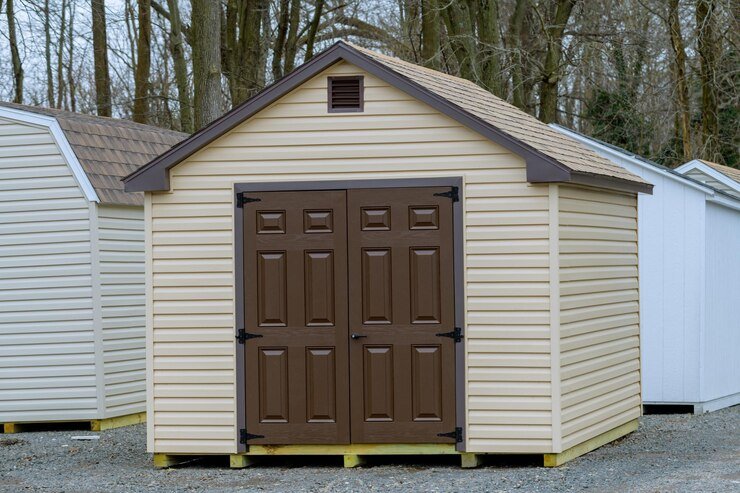Resin vs Wood vs Metal Sheds: Which is Best?
Selecting the right material for a shed is an essential step in enhancing your outdoor space. Whether it’s for an outdoor storage box or a full-sized shed, the choice between resin, wood, and metal determines durability, maintenance requirements, and aesthetic appeal. Each material brings its own strengths and weaknesses, catering to different needs and preferences. Understanding the characteristics of these materials is crucial to making the best choice for your outdoor storage box solution.
| Feature | Resin (Plastic) Shed | Wood Shed | Metal Shed |
| Durability | High; resistant to rot, rust, and pests | Durable, but prone to rot and pests | High; resistant to pests, can rust |
| Maintenance | Very low; no painting or sealing required | High; requires regular treatment and painting | Low; may need rust protection |
| Weather Resistance | Excellent; UV and moisture-resistant | Moderate; vulnerable to moisture | Good; susceptible to rust over time |
| Assembly | Easy; lightweight panels snap together | Difficult; complex assembly | Moderate; may require more tools |
| Aesthetic Appeal | Modern look, various colors available | Classic, natural look, customizable | Industrial look, limited design options |
| Cost | Moderate | Expensive | Affordable |
| Lifespan | 15-20 years | 20+ years (with proper care) | 10-20 years |
| Weight | Lightweight | Heavy, sturdy | Heavy, sturdy |
| Insulation | Moderate | Excellent; natural insulation | Poor; conducts heat and cold |
| Best For | Low-maintenance backyard storage | Traditional gardens, customizable spaces | Tools, equipment, general storage |
Resin Sheds: Lightweight and Maintenance-Free
Resin sheds, often crafted from high-density polyethylene or polypropylene, have gained popularity for their lightweight and low-maintenance qualities. These sheds resist moisture, rust, and pests, making them ideal for humid or wet climates. Many resin sheds come with UV protection, ensuring they remain fade-free under prolonged sunlight exposure. Their seamless assembly process and compatibility with outdoor storage boxes make them a favorite among homeowners looking for convenience. However patiowell sheds may lack the structural strength of wood or metal, particularly in areas prone to heavy snow or strong winds.
Wood Sheds: Timeless Appeal and Natural Charm
Wood sheds offer unmatched aesthetic appeal, blending seamlessly with natural surroundings. These sheds are highly customizable, allowing you to paint, stain, or modify them to suit your style. Wood is also a natural insulator, providing a comfortable interior for workshops or storage of temperature-sensitive items. While their charm is undeniable, wood sheds require regular maintenance to protect against rot, pests, and weathering. They are often more compatible with traditional outdoor storage boxes, offering a cohesive, rustic look. For those who prioritize beauty and flexibility, wood sheds are an excellent choice.
Metal Sheds: Durability and Security
Metal sheds are renowned for their strength and longevity. Made from materials such as galvanized steel or aluminum, these sheds can withstand harsh weather conditions and offer excellent security. Metal sheds are particularly suitable for storing heavy equipment or valuable tools. While they excel in durability, they may not provide the same aesthetic warmth as wood or the lightweight convenience of resin. Additionally, metal sheds can become hot in direct sunlight and may require rust-proof coatings for long-term use. For those prioritizing security and resilience, metal sheds are a reliable option.
Comparing Maintenance Requirements
Maintenance is a critical factor when choosing a shed material. Resin sheds are virtually maintenance-free, requiring only occasional cleaning with soap and water. Wood sheds demand consistent care, including sealing, painting, or staining, to protect against environmental damage. Metal sheds require minimal upkeep but may need periodic rust treatments depending on the climate. For homeowners seeking a hassle-free outdoor storage solution, resin sheds stand out as the most practical choice.
Environmental Considerations
Sustainability plays an increasing role in material selection. Wood sheds are the most environmentally friendly option, provided the wood is sourced responsibly. Metal sheds are recyclable but have a higher carbon footprint due to energy-intensive production processes. Resin sheds, while recyclable in some cases, contribute to plastic waste if not disposed of properly. Weighing the environmental impact of each material can guide you toward a decision that aligns with your values and sustainability goals.
Read Also: Everything You Need to Know About Sacramento Roofing
Practical Applications and Space Efficiency
The intended use of the shed is another key consideration. Resin sheds work well for small to medium-sized outdoor storage boxes or garden tools, offering lightweight and weather-resistant solutions. Wood sheds provide ample customization for workshops, studios, or multi-functional storage spaces. Metal sheds are perfect for heavy-duty storage, such as machinery or large equipment. Matching the material to your specific needs ensures the shed will meet your expectations in functionality and performance.
Conclusion
Choosing between resin, wood, and metal sheds depends on a careful evaluation of your requirements, climate, and aesthetic preferences. Resin sheds excel in low maintenance and convenience, making them ideal for quick outdoor storage solutions. Wood sheds offer timeless charm and customization but require ongoing care. Metal sheds deliver unmatched durability and security, suitable for long-term storage of valuable items. By considering factors such as maintenance, environmental impact, and intended use, you can confidently select the perfect shed to enhance your outdoor space and meet your storage needs.






